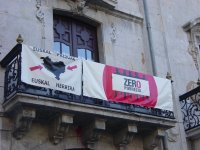
Today I went to the birthplace and headquarters of the MCC, Mondragón, or Arrasate as it is known in Basque. Mondragon is a bustling town of at least 30,000. But just like Oñati it is a town that appears much bigger because it is squeezed in a valley (also, there is a huge imposing rocky mountain just outside of town). Consequently, there are a lot of tall buildings narrow streets and a lot of hustle and bustle people in the street in the middle of the day. The middle of town is a picturesque medieval town square. In the main square of Mondragon, on a balcony of the city hall building there was a
 banner hanging that said a Basque independence slogan and "Zero Pobrezia" or Zero Poverty in Basque. Mondragon, itself is not a poor place. There was a lot of construction, and brand new, fancy apartment buildings and stores. This is clearly a place that is dong well. Nevertheless, the two slogans are about independence and eradicating poverty. That says a lot about the way things are run in Mondragon.
banner hanging that said a Basque independence slogan and "Zero Pobrezia" or Zero Poverty in Basque. Mondragon, itself is not a poor place. There was a lot of construction, and brand new, fancy apartment buildings and stores. This is clearly a place that is dong well. Nevertheless, the two slogans are about independence and eradicating poverty. That says a lot about the way things are run in Mondragon.Unfortunately, I didn't spend too much time there or even see any of the industrial coops. I actually went there to go to Eroski, which is Spain's 2nd largest retailer and the largest company in MCC. It is a worker and consumer coop and has about 30,000 workers, only about 12,000 of whom are worker-owners. The chain consists largely of supermarkets, but is increasingly using the Hiper-mercado format which is like the Wal-Mart Super Center. An all-in-one store that has a full service supermarket, clothes, house wares, electronics, a restaurant, cellphone dealer, travel agent, realtor and more stuff, I forget. Affordable stuff, not fancy. Although you have never seen a seafood section like this in a supermarket in the US. All kinds of crazy seafood, eels, unidentifiable stuff. Should have taken a picture.
The predominance of non-owner workers (more than 60%) is due to an aggressive and rapid expansion on the part of Eroski to preempt the competition (large retailers like Carrefour from France) and prevent the possibility of companies like Wal-Mart from coming into the country. The strategy is to go head-to-head with these companies and then go about incorporating the workers into an ownership structure. As for my experience at Eroski it was pretty cool. The bus dropped me off downtown and the Hiper-mercado is located on the edge of town so after a 20 minute walk through a light-industrial zone along the river. As you can see from the picture, there are a lot construction cranes. Lots of nice apartments. The store is huge, super clean, super orderly and the workers really nice. It was very much like being in a store in the US, except forthe fish.
As for my experience at Eroski it was pretty cool. The bus dropped me off downtown and the Hiper-mercado is located on the edge of town so after a 20 minute walk through a light-industrial zone along the river. As you can see from the picture, there are a lot construction cranes. Lots of nice apartments. The store is huge, super clean, super orderly and the workers really nice. It was very much like being in a store in the US, except for the fish.
They have also recently announced that all of the brands they sell under the Eroski name will be ranked environmentally. That is, organic products, recycled paper etc. will be labeled and have priority positions on shelves.
I hope to go back to Mondragon soon and give you an update.
2 comments:
The example you gave, of Eroski using an aquisition strategy, to keep Carrefour and Walmart out of the Spanish market is a great example of taking your values into the market.
It reminds me of Gramsci's "war of position" - first Eroski takes the position with the aquisition, then it introduces workplace democracy, developing another democratic space in the market.
It's complex, but it sounds like they're managing it well.
It is truely an example of bringing values to the market, acting entrepenuerally and boldly. It is also quite complex as you mentioned. Sometime in the late eighties or early ninties, with European integration looming, Eroski was a small regional chain. It was aware that big multinational competition was likely to enter he market in a big way. Eroski was faced with three options, become more of a niche store, grow or die. They chose grow, which they did at a very rapid rate. The result has been higly positive, and perhaps most encouraging of all is that they are competing directly against the competition and winning.
Post a Comment